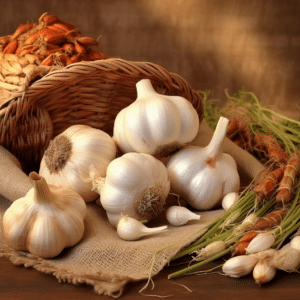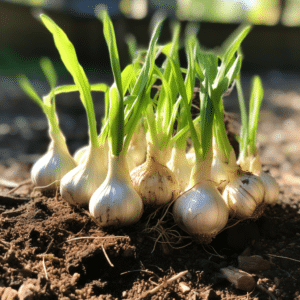Garlic is a versatile and flavorful herb that is easy to grow in your own garden. Whether you are a seasoned gardener or a beginner, this comprehensive guide will provide you with all the information you need to successfully grow garlic. From understanding different types and varieties of garlic to nurturing your plants to maturity, this guide covers all aspects of garlic cultivation. Get ready to embark on a rewarding gardening journey and enjoy the delicious taste of homegrown garlic in your dishes.
Understanding Garlic: Types and Varieties

Before getting started with growing garlic, it’s important to understand the basics of this herb. Garlic, scientifically known as Allium sativum, belongs to the onion family and is native to Central Asia. There are two main types of garlic: hardneck and softneck, each with its own unique characteristics and growing requirements.
The Basics of Garlic
Garlic is known for its pungent smell and distinctive flavor. It is widely used in culinary dishes worldwide and has numerous health benefits. In addition to its culinary uses, garlic has been used for centuries in traditional medicine for its potential antibacterial and antifungal properties.
Garlic bulbs are composed of multiple individual cloves, each encased in a papery skin. These cloves grow in clusters and are the part of the plant that is used for cooking and planting. The cloves themselves are rich in essential oils, which give garlic its characteristic aroma and flavor.
When it comes to growing garlic, it’s important to note that it is a cool-season crop. It thrives in well-drained soil with plenty of organic matter. Garlic prefers full sun but can tolerate partial shade. It is typically planted in the fall, allowing the bulbs to develop over the winter months and be ready for harvest in the following summer.
Common Garlic Varieties
When it comes to garlic varieties, the options are abundant. Some of the most common varieties include Rocambole, Porcelain, Purple Stripe, and Artichoke. Each variety has its own unique flavor profile and growing preferences, so it’s important to choose the right one for your garden.
Rocambole garlic, for example, is known for its rich and complex flavor. It has a robust and spicy taste that intensifies when cooked. Porcelain garlic, on the other hand, has large cloves and a mild yet sweet flavor. Purple Stripe garlic has beautiful purple streaks on its skin and a strong, rich flavor. Artichoke garlic is known for its mild and slightly sweet taste, making it a popular choice for roasting.
When selecting garlic for planting, it’s crucial to choose high-quality bulbs that are disease-free. Look for bulbs that are plump, firm, and have unbroken skin. Avoid bulbs that are soft or have moldy spots, as these may indicate disease or poor quality. You can purchase garlic bulbs from reputable nurseries or online seed catalogs. It’s also a good idea to choose varieties that are well-suited to your climate and growing conditions.
Garlic is a versatile and rewarding plant to grow in your garden. Not only does it add flavor to your meals, but it also offers a range of health benefits. From its rich history to its diverse varieties, garlic is truly a remarkable herb that deserves a place in every garden.
Preparing Your Garden for Garlic
Before you start planting garlic, it’s necessary to prepare your garden beds to ensure optimal growing conditions for your plants.
Soil Requirements for Garlic
Garlic thrives in well-drained soil that is rich in organic matter. The soil should have a pH level between 6.0 and 7.5, which is slightly acidic to neutral. If your soil is clayey or compacted, consider adding compost or well-rotted manure to improve its texture and fertility.
Ideal Climate Conditions
Garlic grows best in areas with cool winters and moderate summers. It requires a period of cold dormancy to produce large bulbs. If you live in a region with mild winters, you can still grow garlic successfully by planting in the fall or using techniques like chilling the bulbs in the refrigerator before planting.
Preparing the Planting Bed
To prepare the planting bed, start by removing any weeds or debris. Loosen the soil using a garden fork or tiller, breaking up large clumps and removing any rocks. Incorporate organic matter into the soil, such as compost or aged manure, to improve its fertility and moisture retention.
Planting Your Garlic

Now that your garden is ready, it’s time to plant your garlic and watch it grow!
When to Plant Garlic
The best time to plant garlic depends on your climate. In most regions, planting garlic in the fall, about four to six weeks before the ground freezes, is recommended. This allows the cloves to establish roots before winter and ensures early spring growth. If you live in a warmer climate, you can plant garlic in early spring.
How to Plant Garlic Cloves
Planting garlic cloves is a straightforward process. Start by breaking a bulb into individual cloves, being careful not to damage the cloves. Plant each clove with the pointed end facing up, about two inches deep and six inches apart. Space the rows about 12 inches apart to allow enough room for the plants to grow.
Care and Maintenance After Planting
After planting your garlic, ensure proper care and maintenance to promote healthy growth and prevent common issues.
Watering Your Garlic: Garlic requires consistent moisture, especially during hot and dry periods. Water the plants deeply once or twice a week, providing about one inch of water. Avoid overhead watering, as it can promote disease.
Dealing with Weeds and Pests: Keep your garlic bed weed-free to prevent competition for nutrients and moisture. Mulching the bed with straw or leaves can help suppress weeds. Common pests that may attack garlic include aphids, onion maggots, and fungal diseases. Monitor your plants regularly and take appropriate measures to control pests and diseases.
Fertilizing Your Garlic Plants: Garlic is a moderate feeder and benefits from organic fertilizers. Apply a balanced organic fertilizer, such as compost or well-rotted manure, in early spring before the plants start actively growing. Avoid excessive fertilization, as it can result in large leaves and small bulbs.
Nurturing Your Garlic to Maturity
Congratulations! Your garlic plants are growing, and it’s time to nurture them until they reach maturity.
Watering Your Garlic

Continue to water your garlic plants regularly, especially during dry spells or if you notice signs of wilting. Adequate and consistent moisture is crucial for bulb development.
Dealing with Weeds and Pests
Throughout the growing season, keep an eye out for weeds and pests. Remove weeds by hand or using a hoe, making sure not to disturb the garlic plants’ shallow root system. Use organic pest control methods to manage any pests that may appear.
Fertilizing Your Garlic Plants
As your garlic plants grow, you can apply a side dressing of compost or aged manure around the base of the plants. This provides a slow release of nutrients and helps foster bulb development.
Harvesting and Storing Garlic: Garlic is usually ready for harvest when the leaves start to turn yellow and dry out. Carefully dig up the bulbs using a garden fork or trowel, being careful not to damage them. Allow the harvested garlic to cure in a warm, dry, and well-ventilated area for two to three weeks. Once cured, trim the roots and foliage and store the bulbs in a cool, dry place with good air circulation.
Conclusion
Growing garlic is a rewarding experience that allows you to enjoy the flavorful and aromatic herb right from your own garden. By understanding different varieties of garlic, preparing your garden bed, and providing proper care and maintenance, you can harvest your own bumper crop of garlic. So, grab your gardening tools and get ready to embark on a journey of growing your own garlic. Happy gardening and enjoy the delicious taste of freshly harvested garlic!